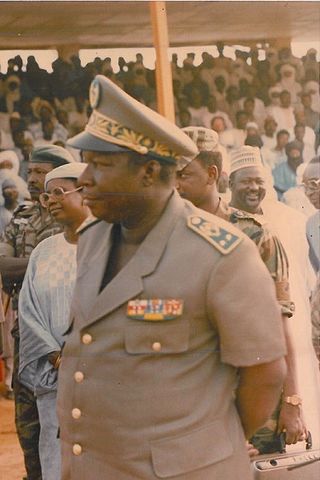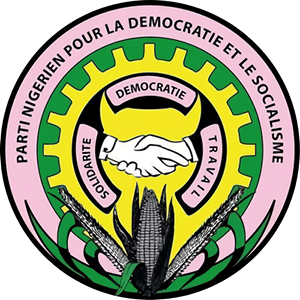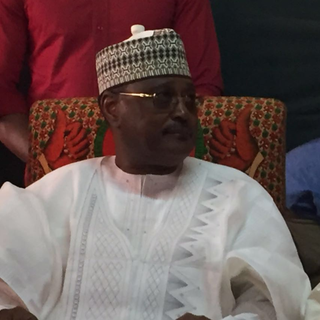Union of Workers' Trade Unions of Niger | |
| Union des Syndicats des Travailleurs du Niger | |
| Founded | 1960 |
|---|---|
| Headquarters | Niamey, Niger |
| Location | |
Members | 60,000 |
Key people | Abdou Maigandi, secretary general |
| Affiliations | ITUC, OATUU |
The Union of Workers' Trade Unions of Niger (USTN) is a national trade union center in Niger. Formed in 1960 as the Union Nationale des Travailleurs du Niger (UNTN), the union was renamed in 1978 as the USTN.
The 1988 establishment of the National Movement of the Development Society (MNSD) in Niger saw close ties between the USTN and the MNSD. However, the USTN's support for the pro-democracy movement lead to tension, including police raids, and the 1990 detention of then secretary general Laouali Moutari.
The USTN is affiliated with the International Trade Union Confederation, and the Organization of African Trade Union Unity.
This is the history of Niger. See also the history of Africa and the history of West Africa.

Politics of Niger takes place in a framework of a semi-presidential representative democratic republic, whereby the President of Niger is head of state and the Prime Minister of Niger head of government, and of a multi-party system. Executive power is exercised by the government. Legislative power is vested in both the government and the National Assembly.

Hama Amadou is a Nigerien politician who was Prime Minister of Niger from 1995 to 1996 and again from 2000 to 2007. He was also Secretary-General of the National Movement for the Development of Society (MNSD-Nassara) from 1991 to 2001 and President of the MNSD-Nassara from 2001 to 2009. Amadou is from the Kurtey, a Fula sub-group, and was raised in the Tillaberi Region, in the Niger River valley, north of Niamey.

Mamadou Tandja was a Nigerien politician who was President of Niger from 1999 to 2010. He was President of the National Movement for the Development Society (MNSD) from 1991 to 1999 and unsuccessfully ran as the MNSD's presidential candidate in 1993 and 1996 before being elected to his first term in 1999. While serving as President of Niger, he was also Chairman of the Economic Community of West African States from 2005 to 2007.

Elections in Niger take place within the framework of a semi-presidential system. The President and National Assembly are elected by the public, with elections organised by the Independent National Electoral Commission (CENI).

Ali Saibou was the third President of Niger from 1987 to 1993 succeeding the deceased Seyni Kountché.

The National Movement for the Development of Society is a political party in Niger. Founded under the military government of the 1974–1990 period, it was the ruling party of Niger from 1989 to 1993 and again from 1999 until 2010, when a coup on 18 February 2010, by a military junta called the Supreme Council for the Restoration of Democracy (CSRD) ousted the president, Mamadou Tandja.

The Democratic and Social Convention - Rahama is a political party in Niger.

The Nigerien Party for Democracy and Socialism is a political party in Niger. It is a broadly left-leaning party, part of the Socialist International, and in 2011, it has been in power following the election of the former long-time leader, Mahamadou Issoufou. Mohamed Bazoum is the former President and the former Secretary-General is Foumakoye Gado.
Amadou Boubacar Cissé is a Nigerien politician. He served as the Prime Minister of Niger on two occasions, from 8 to 21 February 1995 and again from 21 December 1996 to 27 November 1997. He has led a political party, the Union for Democracy and the Republic (UDR-Tabbat), since 1999, and he was appointed as Minister of State for Planning in 2011.

Seyni Oumarou is a Nigerien politician who was Prime Minister of Niger from June 2007 to September 2009 and President of the National Assembly of Niger from November 2009 to February 2010. He is from the west of the country and is a member of the Djerma ethnic group. Since November 2008, he has been the President of the National Movement for the Development of Society (MNSD). He unsuccessfully stood as a presidential candidate in 2011, 2016 and 2021. After years as an opposition leader under President Mahamadou Issoufou, he was appointed to the post of High Representative of the President in October 2016.
Oumarou Sidikou was a Nigerien politician. He was Vice-Governor of the Central Bank of West African States (BCEAO) from 1988 to 1993. He was a member of the National Movement for the Development of Society (MNSD) and, following the January 1995 parliamentary election, which was won by an alliance that included the MNSD, Sidikou was appointed as Minister of State in charge of Industrial Development, Trade, the Craft Industry, and Tourism in the government of Prime Minister Hama Amadou on February 25, 1995. This government was ousted in a military coup on January 27, 1996.
Habi Mahamadou Salissou is a Nigerien politician and a former Secretary-General of the centre-right National Movement for the Development of Society (MNSD). He served in the government of Niger as Minister of Secondary and Higher Education from 2001 to 2004 and as Minister of Trade and Industry from 2004 to 2007.
Mohamed Abdoulahi is a Nigerian politician who served in the government of Niger as minister of mines and energy from 2004 to 2010, under President Mamadou Tandja.
Albadé Abouba is a Nigerien politician who has been the Secretary-General of the National Movement for the Development of Society (MNSD-Nassara) since 2009. He served in the government of Niger as Minister of the Interior from 2002 to 2004 and again from 2007 to 2010. Abouba also served as Prime Minister in an acting capacity for a brief period in September–October 2009. In August 2013 he served in the government of Mahamadou Issoufou as Minister of State. He is now the president of The MPR-Jamhuriya, a political party that he created in October 2015 and since April 2016 he served as Minister of State, Minister of Agriculture and livestock.

The Alliance of the Forces of Change was one of the two large political coalitions which contested for power in Niger from 1991 to 1996.

The Cabinet of Niger is made up of the appointed heads of Niger's government Ministries. Ministers are chosen from the elected members of the National Assembly of Niger. According to the Constitution of 18 July 1999 the Prime Minister of Niger proposes the membership of the Council of Ministers, and the President of Niger appoints the Ministers, which is then authorized by the National Assembly. The Council of ministers meets at the discretion of the President, advises him on policy, and carries out the policies he orders. The Council of Ministers is headed by the Prime Minister of Niger, who is put forward by the National Assembly, and accepted by the President. The Assembly may remove the Prime minister by a vote of no confidence.

Parliamentary elections were held in Niger on 20 October 2009, after President Mamadou Tandja dissolved the National Assembly in May 2009 and a constitution referendum was held in August 2009. The elections were boycotted by most opposition parties, and saw Tandja's National Movement for the Development of Society (MNSD) win a landslide victory.